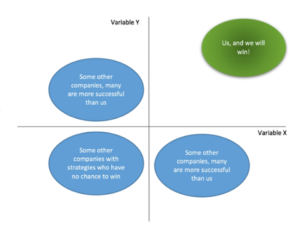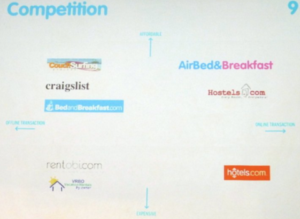Originally published in Business Insider
By Lylan Masterman
One of the most common slides in startup pitch decks is the competitive analysis slide.
You know, the slide where your company is in the top-right corner and your competitors are all doomed to fail.
I normally appreciate this slide.
I want… scratch that… I need to know why your company will win versus your competition.
I also want to be impressed by your thorough knowledge of your vertical, your strategy for winning, your marketing message relative to your competitors.
Normally this slide is very insightful to VCs.
However, too many times I see founders carefully choosing the variables in the x- and y- axes so that they are in the winning top right corner, and their competitors are weakly positioned.
It always looks like this:

The x- and y- axes seemed to be artfully chosen to put the CEO’s company in the top-right corner, but the axes appeared to be irrelevant or tertiary factors for comparison with the competition.
I’m sure that when this happens it’s not as much a function of dishonesty as that the founder is overly eager to obey rules of thumb. They are desperate to be in the winning corner. Being an entrepreneur is a high stakes game; they need to believe they will win.
However, if you find that you are doing this in your competitive analysis slide, it’s a marker of much bigger problems. It means that you probably are not in fact set up to win. All of the PowerPoint magic in the world is not going to fix that for you.
When founders measure the right variables, and the slide is clean and makes total sense, they are likely onto something.
Here is Airbnb’s 2011 slide in their original deck:

This slide accurately shows that in Airbnb’s early days, online/offline transactions and cost were indeed two of the company’s most important differentiators that led to millions of people using the service. And they were well positioned to lead in this new market.
But if Airbnb had put “pet friendliness” and “cleaning fee” in as variables, people like me would scratch our heads. Not enough people travel with pets to matter, and a cleaning fee was not one the most important factors for property hosts.
Ultimately, the key reason I care about the competitive differentiation slide is that I want to appreciate the two most important reasons that your users or customers will choose your product over the competition.
It’s a story you tell about how you will win. And if your story does not make sense, I have stopped reading your deck and moved on to the next.
Lylan Masterman is a Kauffman Fellow and venture capital investor at White Star Capital.
